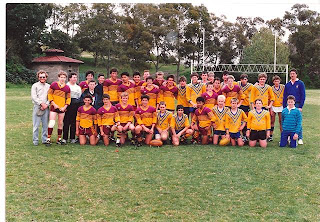It was during one of these 'wait' sessions, I first met the remarkable John.
I was used to meeting 'famous' people - especially during footy season - but John was different. He was exceptional.
 |
| John is standing in the back row 10th from the left |
Now Dad and Darren are born statesmen and so meeting John for the first time was no exception - for Dad. For me, it was a whole other story! Anyway... Dad being Dad (known for his solid handshake), put his hand out in greeting to John (Hadn't Dad been listening during Daz's 10 second de-brief?)
Not surprisingly, John smiled up at him, "I'm sorry Mr Junee, I can't."
I didn't understand what John meant, but without missing a beat, Dad stepped forward and patted him gently on the back with a 'Nice to meet you Johnnie' (another one of Dad's things).
It was then I learnt the significance and social ability of touch.
Taking Dad's lead, I too stepped forward when it was my turn to be introduced and touched John on the shoulder. However, I literally sent him into spasm! Not the response I was expecting, although it did prove a great ice-breaker...
Not knowing what I'd done or what I was supposed to do, I did what I do best: straight shooting. I asked John straight up what had just happened. After a moment, when he'd caught his breath, he laughed and explained he sometimes had spasms - it was just something that happened, ever since his accident.
You see John didn't have the facility to engage in a handshake (which is why Dad touched him on the shoulder); he still doesn't. John became what is called an incomplete quadriplegic after a head clash during a football match at the tender age of 15. Although, he does have the sensation of touch (so Dad must have been listening afterall!) and the spasms are what he calls the powercord effect of his disconnected nerves.
However, 21 years on from his accident, still wheelchair-bound and in need of 24/7 care, is not going to stop John 'walking'(okay rolling) his way from Brisbane to Sydney next year to raise money for the people at Youngcare with his girlfriend Theresa and best mate Paul.
 |
| JT has been a statistician for his beloved Wests Tigers since 1993 |
John is sharing a little more of his story - not always an easy thing, even for one as open as John - in order to promote the work of Youngcare who are kicking off their fund-raising long weekend with the inaugural Thong Day tomorrow (1 October).
So what is Thong Day? I hear you say... Well I'm glad you asked.
Tomorrow is Youngcare Thong Day, so click the link, find out how you can donate and get involved because access to 24/7 care for those who need it to survive should be a right, not a privilege.
Disability is not discriminating, it can happen to anyone at any time. So whenever you get the opportunity to improve the quality of life of someone living with disability, grab it with both hands, for no other reason, than you still can.
 |
| Chatting with JT about living with disability and the National Disability Insurance Scheme earlier this year |
